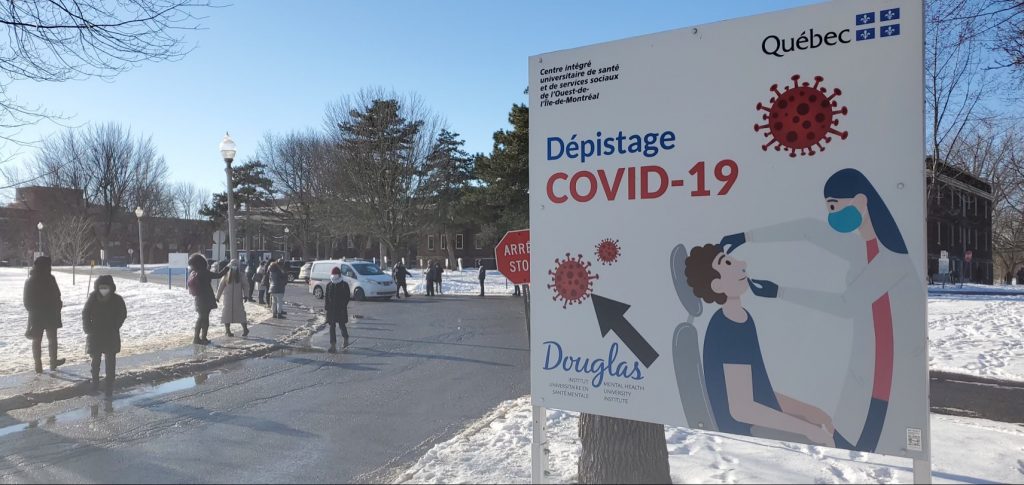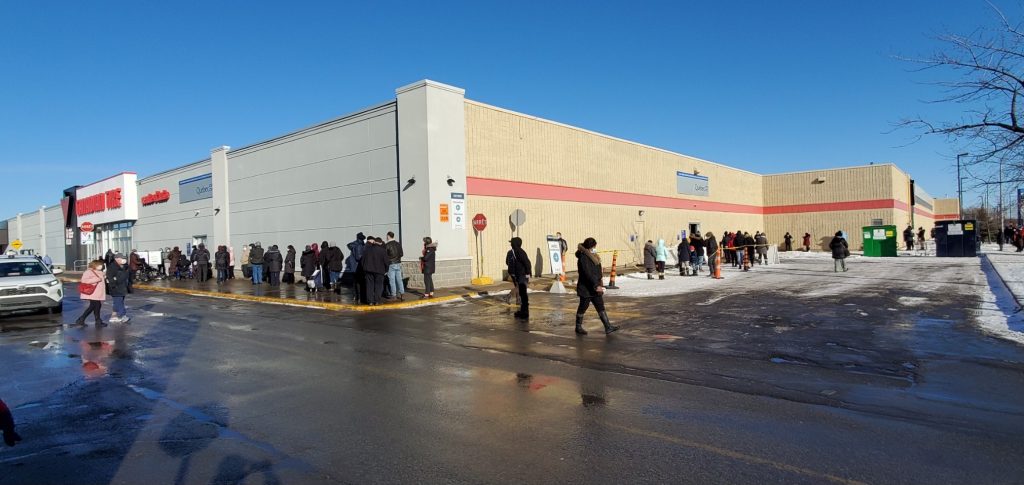Quebec testing centres overwhelmed by the fifth wave of COVID-19

Posted December 21, 2021 1:51 pm.
Last Updated December 21, 2021 2:43 pm.
COVID-19 testing centres in Quebec are being overwhelmed by the pandemic’s fifth wave, with long lineups to get a test and delays in results as the Omicron variant pushes daily case counts to record levels.
The union representing 5,400 laboratory technicians in the province says the recent surge in demand for testing is pushing laboratories to their limits.
“There’s a feeling of despair. Those who are young enough to change career are doing so, while those who are close to retirement leave to enjoy their health,” Sandra Etienne, a vice-president of the Alliance du personnel professionnel et technique de la sante et des services sociaux, said in an interview Monday.
Etienne, who works as a biomedical laboratory technician, said that during the pandemic medical technologists have yet to receive the recognition given nurses – who were offered $15,000 in bonuses to keep them from quitting the public system in the fall.
“They are reacting like soldiers right now,” Etienne said of laboratory technicians. “But soldiers who are asking to be recognized.”
#WATCH: Long line for testing at the Douglas site in Verdun on Tuesday. Are you seeing long delays? pic.twitter.com/54Wgyc0cJl
— CityNews Montreal (@CityNewsMTL) December 21, 2021
Quebec Health Minister Christian Dube likened the current COVID-19 situation to a “war” on Monday when he asked that only people with symptoms seek a test. Labs have recently been processing around 40,000 tests a day, hitting a high of 46,830 on Dec. 15.
“It’s a record since the beginning of the pandemic, and it’s, unfortunately, our maximum capacity,” Dube said. “Testing centres should not be a tool to get tested if you’re asymptomatic and you want to gather with your loved ones.”
Dube asked people to prioritize at-home rapid tests to avoid clogging laboratories. The provincial government has pledged to distribute more than 800,000 rapid test kits through pharmacies across the province by Christmas.
Annie-Claire Fournier, a spokeswoman for the McGill University Health Centre, said its laboratories, which on average analyze 15,000 tests per day, have recently seen an increase of as many as 1,000 tests a day.
“Ninety-nine per cent of analyses are performed within 24 hours,” Fournier said in an email. The results are usually shared with patients within 24 to 48 hours, she added.
The sharp rise in demand for testing, however, is causing some delays in results.
For Dominique Primeau, who had been waiting for her results for three days, the delay is a source of stress. She said Tuesday that she started to experience COVID-19 symptoms on Saturday. She tried to get tested on the south shore of Montreal but couldn’t find a walk-in clinic.
She next tried a drive-thru testing site in Montreal, but it was closed on Saturdays. She went to another clinic but there was “a never-ending line” and it closed before she could get in. Primeau said she finally got tested on Sunday, after waking up at 5 a.m. and waiting almost two hours in the cold.
“It’s never fun being sick and not knowing what you have,” Primeau said. “I want to know what kind of holidays I’ll be having. If I have COVID, I have to isolate, I have to cancel plans. It’s not easy.”



Primeau’s experience won’t be unique as testing centres hit maximum capacity. Jean-Nicolas Aube, a public health spokesman at CIUSSS du Centre-Sud-de-l’Ile-de-Montreal, one of the city’s largest health authorities, said the authority usually handles 1,500 tests a day but is now above 2,000.
“It’s been a major increase and it continues,” he said in an interview. “The demand is high, but we will adjust.”
Aube echoed Dube’s advice that people should go to testing centres only if they have symptoms.
“People are coming to get tested because they have a party,” he said. “We heard it, we saw it, we understand, but now we have to make room for people who have symptoms.”








